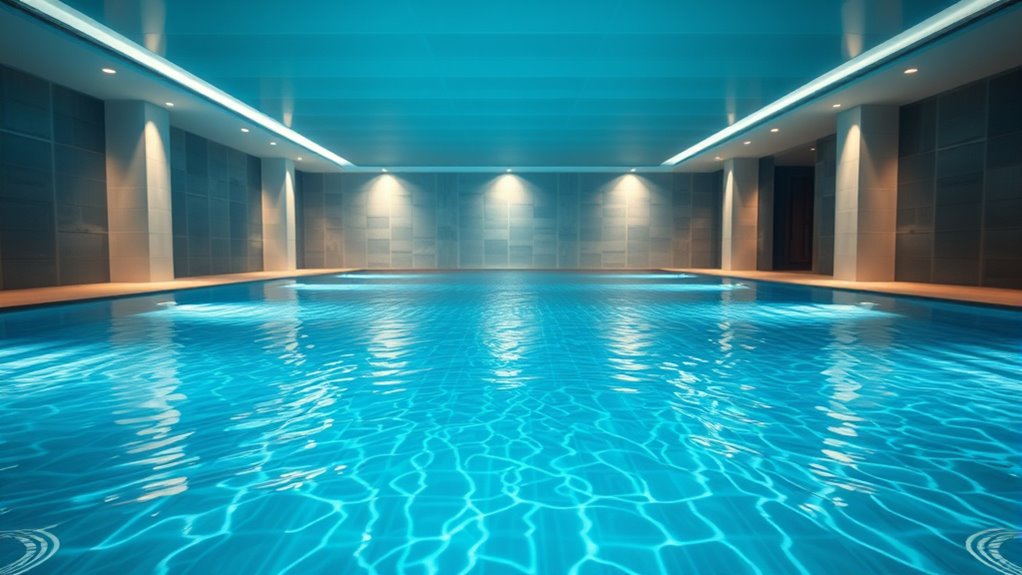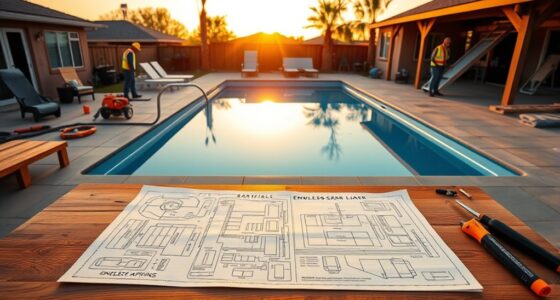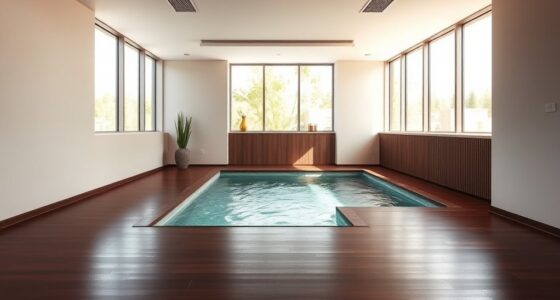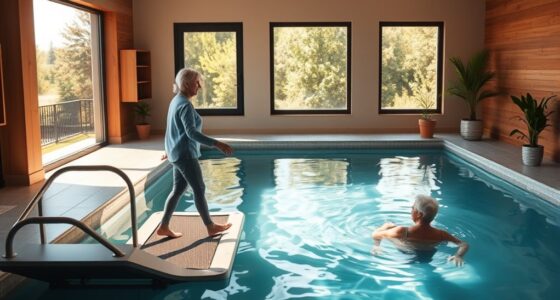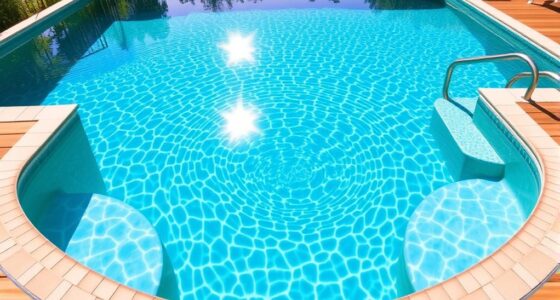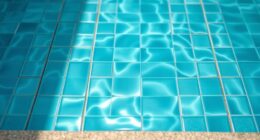Endless pools produce a steady hum similar to household appliances, generally staying within 50 to 70 decibels. You’ll notice the noise mainly from the pump and filter, but it’s usually unobtrusive and blends into background sounds. Kitchen appliances like dishwashers or refrigerators are comparable, and proper maintenance can keep noise levels down. While some vibrations or hums might be noticeable, most users find their pools surprisingly quiet—if you want to discover how to keep it that way, keep going.
Key Takeaways
- Endless pools produce a steady hum around 50-60 decibels, similar to background conversation or a dishwasher.
- Pump and motor noise levels depend on horsepower; higher power typically results in louder operation.
- Proper maintenance, water level, and soundproofing can significantly reduce noise and vibrations.
- During standby, the pool is quieter than a washing machine’s spin cycle, blending into household background sounds.
- Overall, the noise is unobtrusive, making it suitable for home environments without causing disruption.
Understanding the Noise Sources of Endless Pools
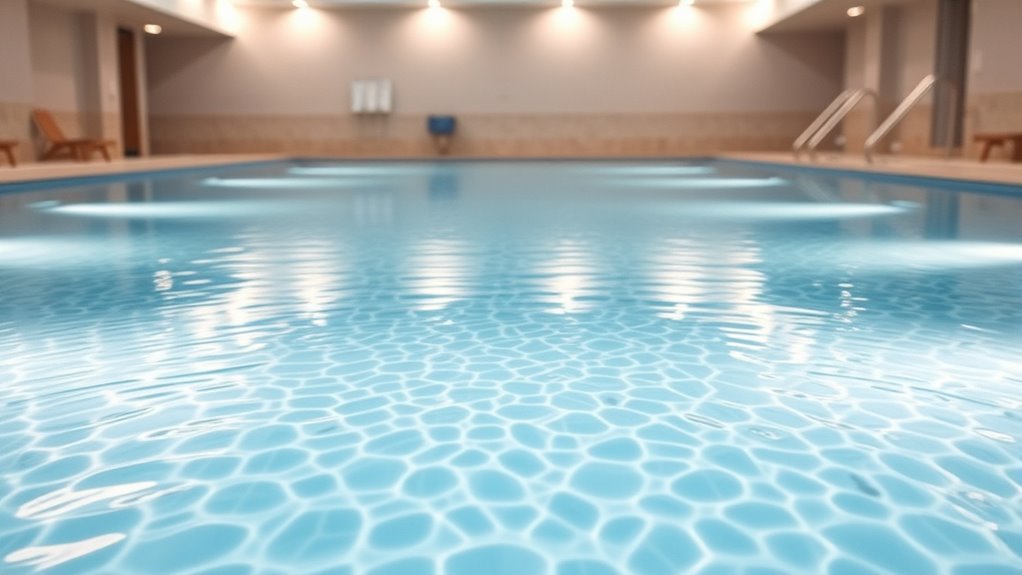
Understanding the noise sources of endless pools is essential if you want to create a peaceful swimming environment. The primary noise comes from the pump, which circulates water and can produce a steady hum. The motor driving the pump often creates a consistent droning sound, especially at higher speeds. Additionally, the filtration system adds to the noise, with filters operating to keep the water clean. If your pool has jets or massage features, these can generate additional sounds when in use. Sometimes, vibrations from the pool’s structure or nearby surfaces can amplify noise. Recognizing these sources helps you identify which components contribute most to noise levels, enabling you to take steps to minimize disruptions and enjoy a quieter swimming experience.
Typical Decibel Levels During Operation

During operation, the noise levels of an endless pool typically range from about 50 to 70 decibels, depending on the equipment and settings. At the lower end, you might hear a gentle hum similar to background conversation or a quiet office. As the pump and filtration systems work harder, the noise can increase to a level comparable to a busy street or vacuum cleaner. Factors like pump size, filtration speed, and additional features influence these levels. Most users find the noise manageable, especially if the pool is indoors or in a designated area. However, if you’re sensitive to sound or want a quieter environment, understanding these typical decibel ranges helps you set realistic expectations and plan the placement of your endless pool accordingly. Additionally, advancements in AI safety measures are contributing to quieter and more efficient pool equipment.
Factors That Influence How Loud Your Pool Gets
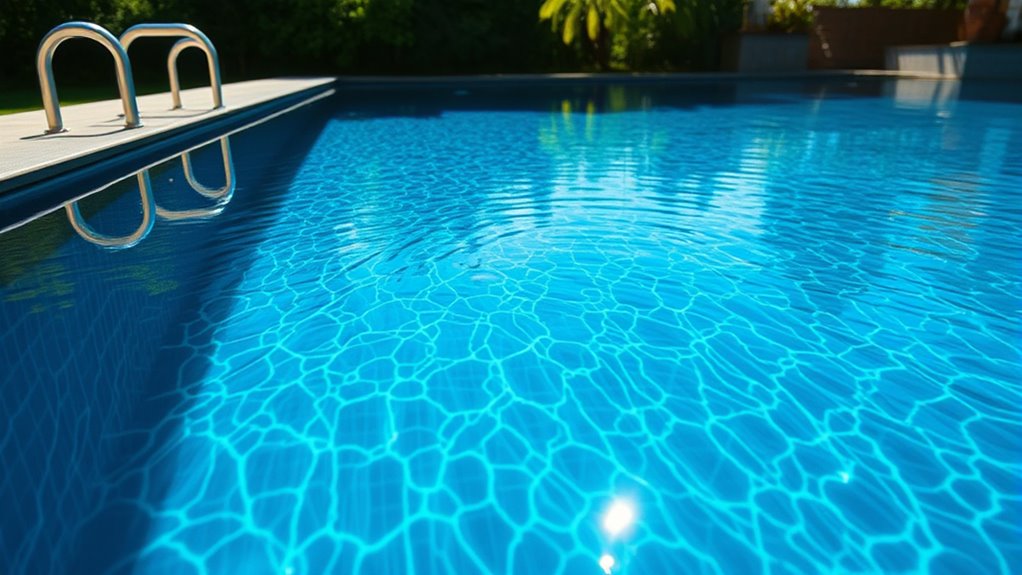
The noise level of your pool depends on several factors you can control. The power of your pump and motor, along with the size and depth of your pool, play significant roles. Additionally, where and how you install your pool can either amplify or reduce the sound it produces. Using self-watering plant pots as a noise dampening method around your pool area can also help minimize sound transmission.
Pump and Motor Power
Pump and motor power directly affect how loud your pool operates. Higher horsepower units typically generate more noise because they work harder to circulate water. If you choose a powerful pump, expect a louder hum during operation, especially at higher speeds. Conversely, lower-powered motors tend to run quieter but may struggle to keep water properly filtered and heated. The design and quality of the motor also matter; well-engineered, efficient motors produce less noise. Variable-speed pumps can help reduce sound levels because they run at lower speeds most of the time, minimizing noise while maintaining performance. Keep in mind, larger, more powerful pumps often require additional soundproofing measures, so understanding your pool’s pump and motor specifications is key to controlling noise levels effectively. Additionally, selecting appropriate equipment can significantly influence overall noise levels and pool operation comfort.
Pool Size and Depth
Larger and deeper pools tend to be louder because they require more water circulation, which means the pump has to work harder and often runs at higher speeds. With increased size, the pump needs to move a greater volume of water, generating more noise. Deeper pools add weight and resistance, requiring stronger circulation and potentially more powerful pumps. This extra effort translates into increased operational noise. Additionally, a bigger or deeper pool can cause more water movement, creating more splashing and turbulence that amplifies sound. The larger the volume of water being moved, the more sound waves are produced, making your pool noisier during operation. If quiet is a priority, consider these factors when choosing a pool size and depth. Cost and Budgeting can influence the size and features of your pool, affecting overall noise levels.
Installation and Location
Have you ever noticed how the placement and surroundings of your pool affect its noise levels? If your Endless Pool is near walls, fences, or dense vegetation, it can reflect or absorb sound, influencing how loud it seems. Installing your pool in an open area with minimal obstructions typically reduces noise buildup. Also, placing it close to your house or neighboring properties can amplify sound transmission, making the noise more noticeable. Conversely, situating it further away or behind sound-absorbing barriers can help keep noise levels down. Consider the terrain too—sloped or uneven ground can affect how sound travels. Proper installation and strategic location choices are key to minimizing noise, ensuring your pool remains a relaxing retreat rather than a noise concern.
Comparing Endless Pool Noise to Other Home Appliances
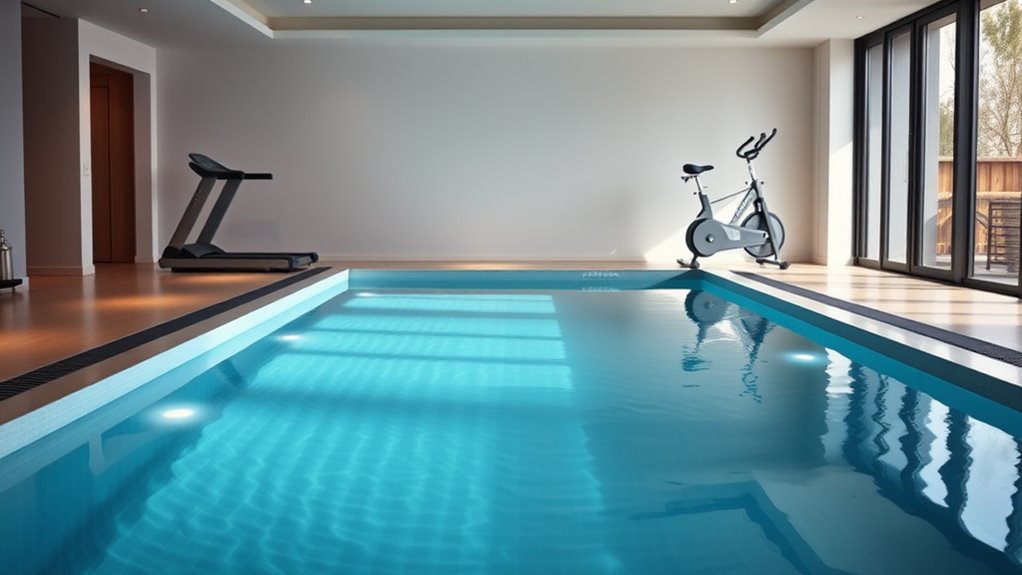
You might notice that the noise from an endless pool is often quieter than some household appliances, like dishwashers or washing machines. However, its operating sounds can still be noticeable, especially during quiet times. Comparing these noises helps you understand what to expect and how they might impact your daily environment.
Noise Levels Compared
While the noise level of an endless pool is generally low, it’s helpful to compare it to other common household appliances. For example, a dishwasher usually operates around 50-60 decibels, similar to the quiet hum of an endless pool’s filtration system. A refrigerator runs at about 40-50 decibels, which is softer than the pool’s background noise. A vacuum cleaner can reach 70 decibels or higher, making it markedly louder. Even a typical conversation is around 60 decibels, well above the pool’s steady, low-level sound. Overall, the endless pool’s noise is comparable to soft household background sounds, making it unobtrusive during daily activities. It’s quieter than many appliances, so it shouldn’t interfere with your peace at home. Additionally, soundproofing techniques can further reduce noise disturbance if needed.
Operating Sound Differences
Compared to common household appliances, the operating sound of an endless pool is especially quieter. While a dishwasher or vacuum can be loud and intrusive, your pool’s pump and filtration system run smoothly and discreetly. You might hear a gentle hum, but it’s unlikely to disturb your peace. To illustrate, here’s a comparison:
| Appliance | Typical Noise Level |
|---|---|
| Endless Pool Pump | 50-60 dB |
| Dishwasher | 60-75 dB |
| Vacuum Cleaner | 70-80 dB |
| Refrigerator | 40-50 dB |
This shows that your endless pool operates at a particularly lower volume, making it a quieter addition to your home. Additionally, the design of an endless pool often emphasizes noise reduction features, further minimizing sound output and enhancing your swimming experience.
Similar Appliance Noises
Although the endless pool operates quietly, its sound level is similar to that of some common household appliances. You might notice a gentle hum comparable to a dishwasher running or a microwave in standby mode. It’s much quieter than a washing machine during a spin cycle but louder than a refrigerator’s occasional compressor noises. The hum isn’t intrusive, so it won’t disrupt conversations or relaxation. If you’re accustomed to background appliance sounds, you’ll find the pool’s noise blends in without issue. This similarity makes it easier to gauge its quietness, confirming that it won’t add significant noise pollution to your home environment. Overall, the endless pool’s sound profile is unobtrusive, comparable to everyday household appliances you’re already familiar with. Additionally, understanding lifestyle considerations can help you create a more comfortable and productive home environment that accommodates various noise levels.
Tips to Minimize Noise and Maintain Quiet Operation
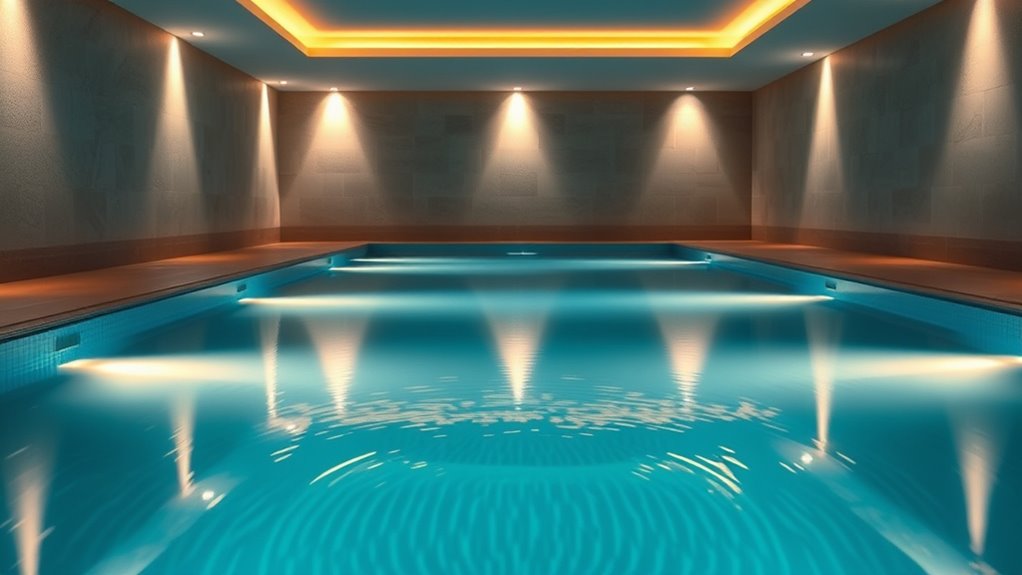
To keep your endless pool operating quietly, regular maintenance is essential. Start by inspecting and tightening any loose components, such as the pump and filter fittings, to prevent vibrations that cause noise. Replace worn-out parts promptly to ensure smooth operation. Keep the filter clean, as a dirty filter strains the pump, increasing noise levels. Use soundproof mats or pads under the equipment to absorb vibrations and reduce sound transmission. Consider installing acoustic insulation around the pump area to further dampen noise. Additionally, make certain proper water levels—low water can cause the pump to work harder and become noisier. Finally, schedule routine checks for leaks or damage, which can contribute to unwanted sounds and disrupt quiet operation. Consistent upkeep keeps your pool running smoothly and quietly. For optimal performance, consider the water quality of your system, as poor water conditions can also lead to increased noise and maintenance needs.
Real-Life Experiences: What Users Say About Pool Noise
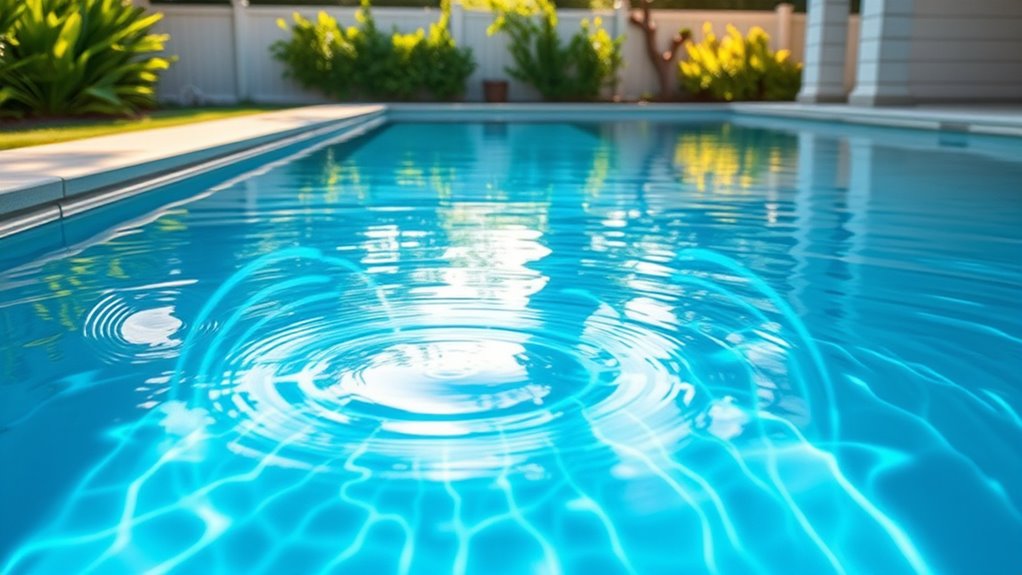
Many pool owners share their firsthand experiences with noise, revealing a wide range of sounds depending on setup and maintenance. Some describe their pools as surprisingly quiet, especially when equipment is well-maintained and properly installed. Others mention occasional hums or vibrations that can be noticeable during quiet moments. You might notice louder noises if the pump isn’t level or if debris causes strain. Regular upkeep, like cleaning filters and tightening fittings, often reduces noise profoundly. Several users also report that initial setup can influence noise levels—poor installation leads to more sound. Proper equipment maintenance significantly impacts noise levels and pool longevity. Overall, your experience depends heavily on how you care for your pool and the quality of your equipment. Staying proactive about maintenance generally results in a quieter, more enjoyable swimming environment.
Frequently Asked Questions
Can Outdoor Placement Reduce the Noise of an Endless Pool?
Yes, placing your endless pool outdoors can help diminish noise. Outdoor placement allows sound to dissipate more easily into the open air, minimizing disturbance to your surroundings. Additionally, outdoor environments often have natural barriers like trees or fences that can further dampen noise. Just ensure your pool is well-maintained and protected from weather elements to keep noise levels manageable and enjoy a peaceful swimming experience.
Does Pool Size Affect the Noise Level During Operation?
Yes, pool size can affect noise levels during operation. Larger pools often require bigger pumps and filtration systems, which tend to be noisier. Smaller pools usually have more compact equipment, generating less sound. Additionally, a bigger pool may produce more splashing and water movement noise. To keep noise down, consider choosing appropriately sized equipment for your pool and installing soundproof barriers if necessary.
Are There Specific Models Known for Quieter Operation?
Yes, certain models are known for quieter operation. Look for pools with advanced noise reduction features, such as insulated panels and quieter pump technology. Brands like Endless Pools and Fitmax offer models designed with sound-dampening materials and quieter motors. You can also choose models with variable speed pumps, which run more quietly at lower speeds. Doing your research and reading customer reviews will help you find a quieter, more peaceful swimming experience.
How Does Maintenance Impact the Noise Levels Over Time?
Maintenance markedly impacts your pool’s noise levels over time. Studies show that poorly maintained pumps and filters can increase noise by up to 30%. When you regularly clean filters, lubricate moving parts, and check for loose components, you reduce vibrations and operational noise. Neglecting maintenance causes parts to wear out faster, leading to louder sounds and potential damage, so staying on top of upkeep keeps your pool quieter and runs smoothly.
Is Additional Insulation Effective in Soundproofing an Endless Pool?
Adding insulation can help reduce noise from your endless pool, but it won’t eliminate sound entirely. Insulation absorbs some vibrations and dampens noise transmission through walls or floors. To maximize soundproofing, you should combine insulation with other measures like installing acoustic panels or using a soundproof enclosure. Remember, the effectiveness depends on the quality of insulation and how well you install it.
Conclusion
Knowing how loud an endless pool can get helps you prepare for the noise battle ahead. While it might seem like a tiny hum at first, it can turn into a roaring beast if you’re not careful—like having a jet engine in your basement! But with the right tips, you can keep the noise at bay and enjoy your pool in peace. Don’t let noise turn your oasis into a sound war; stay informed and keep it quiet!

